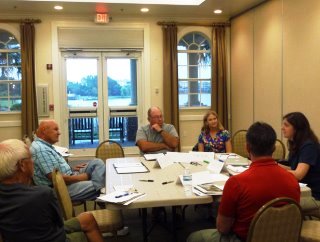|
Article
Courtesy of The Bradenton Herald By
Kathryn Moschella Published
September 29, 2014
LAKEWOOD RANCH -- Considering 62 percent of Lakewood Ranch residents live on ponds and 78 percent pay for private landscapers, the time has come to ensure residents understand how critical their upkeep is to the community ecosystem and drinking water.
That's why a small, determined group of residents have committed to the Protect Our Ponds Task Force, which is meeting monthly at Lakewood Ranch Town Hall under the guidance of the University of Florida and the Manatee County Extension Services officials.
The Protect Our Ponds Task Force, which held its second meeting Monday evening, was created after a community survey in 2013 conducted by University of Florida researchers showed residents knew dangerously little about stormwater retention ponds, their importance, how best to maintain lawns and plants surrounding them, and how pond landscaping and fertilization can harm water quality.
Though a brochure created by a Sarasota social media firm for Lakewood Ranch residents in all five community development districts, the task force is trying to involve homeowner associations in the education program.
|
|
Protect Our Ponds Task Force holds its second meeting Monday evening at Lakewood Ranch Town Hall. The group, led by University of Florida researchers, is trying to instill best practices for stormwater pond care and maintenance.
|
Timing is critical since Manatee County's ban on fertilizers containing nitrogen will end Sept. 30. Liquid fertilizers are banned from Lakewood Ranch and phosphorous fertilizers are banned countywide year-round unless a soil test shows a deficiency.
"My advice is to give each of the HOA boards the reason why this is important," said task force member Joe
Sidiski, supervisor for Greenbrook Village and treasurer of the Greenbrook Village Homeowner Association. "Give them time to digest it. Once you've established the groundwork and got them to understand the issues, have a meeting to propose some solutions and ask for their support and some recommendations. A lot of this falls into the behavioral realm more than anything else."
Sidiski said Lakewood Ranch homeowners who live along ponds are responsible for maintenance between the end of their property line and the pond. The university survey found many residents did not understand certain aquatic plants in and around their ponds filter pollutants and are not eyesores.
They also didn't know landscaper certification is required to apply fertilizer and blowing grass clippings into a pond increases oxygen demand and harms fish and pond water, which in Lakewood Ranch filters into the Braden River.
"These ponds are interconnected so we have to have a comprehensive plan. What my neighbors are doing upstream is coming my way," said Ross Peterson of the Manatee County Extension Service, who formerly worked for Lakewood Ranch Landscape Operations.
Emily Ott, the lead University of Florida researcher assisting the task force, agreed it's a behavioral issue.
"Resident education is key. Maybe people who do care, once they learn, will change their behavior. It's a step in the right direction," she said.
Task force members agreed to ask HOA boards to include information in homeowner manual disc each community development district mails to every resident around the beginning of the year.
"This is laying the foundation for something. I think there's a lot of folks out there who realize, if they're doing something that affects the environment, they might reconsider," Sidiski said.
|
